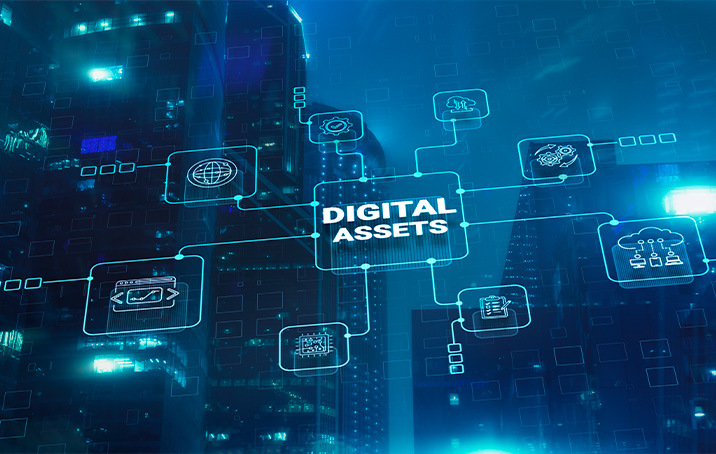Merging of traditional banking, digital assets and the tokenisation of real assets
Economy and Finance | 09.26.2023 | Juan Carlos Salinas Royán

As the digital age has advanced, a new form of value has emerged, known as digital assets. Digital assets are a digital representation of value that is usually recorded with a blockchain that proves its authenticity. Their value will be higher or lower depending on existing demand. Such assets are increasingly common and, just like any other asset, are a form of wealth. So what role are traditional banks playing and what can they offer in this new and changing environment?
Tokenisation of real assets
Traditional banks have played and will continue to play a role in the area of digital assets. That said, we must now introduce a key concept: tokenisation. Tokenisation is dividing a real asset, such as real estate, an artwork or a commodity, into small digital units called tokens using blockchain technology. Splitting large assets into smaller portions makes it easier to buy, sell and trade them. It democratises certain investments that were previously only available to high-net-worth individuals.
What can be tokenised?
Basically, anything that has a value can be tokenised. Here are some examples that may help you better understand this concept.
- Real estate. A building can be tokenised, thus allowing investors to purchase “fractions” of that property. This can make real estate investment more accessible and liquid.
- Art: A valuable work of art can be tokenised, thus allowing several people to have a “part” of the work. This can democratise access to investment in high-value art.
- Goods. Commodities such as gold and oil can be tokenised, thus facilitating their trade and investment.
I have digital assets – why do I need a bank?
Traditional banks are important players in the digital transformation. They have a value that can play a key, even differential, role in digital assets. They have a long tradition in the conservation and management of all types of wealth and are also key institutions that create trust in society. Their know-how and the trust they generate enable them to offer:
- Custody and security. Banks can offer tokenised custody services, thus ensuring that the digital rights to such real assets are secure and protected.
- Ease of access. Though their infrastructure, banks can create platforms on which customers can easily buy, sell or exchange real asset tokens.
- Regulation and compliance. The tokenisation of real assets can be complex from a legal point of view. Banks can help ensure that the creation and trading of tokens complies with all relevant regulations.
What does tokenisation contribute to society?
While for many people this still sounds like science fiction or something far off in the future, the impact of digital assets and tokenisation can affect us personally and provide opportunities for people with very different profiles. This is due to the following three concepts, among others:
- Democratisation of investment. Tokenisation can make investment in traditionally very expensive assets, such as art and real estate, accessible to more people.
- Liquidity. Traditionally illiquid assets, such as art and real estate, can become liquid when they are tokenised. Their fragmentation into “parts” makes them easier to buy and sell.
- Transparency. Tokenisation on a blockchain can provide greater transparency to asset ownership and trading.
The convergence of traditional banking, digital assets and the tokenisation of real assets is a unique opportunity for society. As banks adapt and adopt these new technologies, they can open up a world of new possibilities for their customers. This merging not only benefits banks and their customers; it can also have a positive impact on society as a whole by fostering innovation, inclusion and security in the digital age.
Information on the processing of personal data
In compliance with Law 15/2003 of 18 December on protection of personal data, the customer authorizes that the applicant’s personal data entered on this form will be incorporated into files owned and managed by MORA BANC GRUP, SA – MORA BANC, SAU (hereafter referred to as “MoraBanc”) to process the requested service and, if necessary, to comply with the contracts finally entered into, and also to ensure correct operational procedures.
The applicant expressly authorises MoraBanc to send him/her commercial and promotional communications for products and services and information on the Bank itself, social or other activities, in hardcopy by post or by electronic means (among others, short messages (SMS) to mobile phones, e-mail, etc.). This consent can always be withdrawn, without retroactive effect.
The fact of filling out this form implies that the applicant acknowledges that the information and personal data provided are true, accurate and correct; otherwise, MoraBanc declines all responsibility for the lack of truthfulness or correctness of the data.
The applicant authorises the data provided to be communicated or shared with third parties forming part of the MoraBanc business group, entities which are primarily active in the financial, insurance and service sectors. The applicant is considered as having been informed of this transfer of information by means of this clause. The applicant accepts that he/she may be sent information on any product or service marketed by these companies.
The data processing manager is MoraBanc. The applicant is hereby informed that the rights of access, rectification, suppression or opposition may be exercised in the terms established in current legislation.



